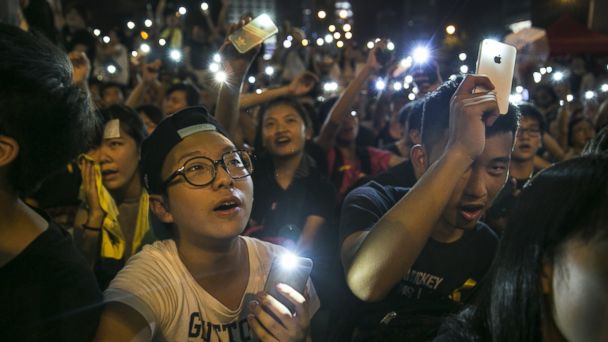Hong Kong Protests: 5 Key Questions Answered

Student protesters hold their cell phone lights while chanting pro-democracy slogans on Oct. 1, 2014 in Hong Kong
So, you've heard about the protests going on in Hong Kong, but are confused about the details? No problem. The situation is complicated and there are many unknowns. We reached out to Elizabeth Economy, the C.V. Starr senior fellow and director, Asia Studies at the Council on Foreign Relations, to help bring some clarity to the fluid situation.
1] We've all heard about the protests in Hong Kong. We'll get to those in a second. But first, can you explain the relationship between Hong Kong and China? Hong Kong was handed back to the Chinese in 1997 after being controlled by the British for more than 150 years. But Hong Kong kind of plays by its own rules to a degree, right? Its populace is afforded more rights than in mainland China in terms of free speech. Please explain.
EE: Beijing governs Hong Kong under the Basic Law, which was negotiated between the British and Chinese governments in the mid-1980s, well before the actual handover. The Basic Law stipulates that Hong Kong will have a special relationship with the mainland, in which a "one country, two systems" form of governance will prevail. The system has protected Hong Kong's capitalist economy and afforded the people of Hong Kong a much more open and transparent political system with a vibrant media and culture of civic participation. The system is guaranteed for 50 years post-handover. Hong Kong's national security and foreign policy, however, are the domain of the Chinese leadership in Beijing.
2] Ok, so, why are there massive protests in Hong Kong right now? Why are people upset?
EE: One Country, Two Systems also provides for the eventual implementation of universal suffrage, albeit with candidates nominated by a broadly representative committee, and the election for chief executive in 2017 is to be the first in which universal suffrage will be put into practice. The protests were triggered by a decision announced on August 31 by China's National People's Congress to limit the committee to the same 1,200 members that have selected the past few chief executives. This would mean that the slate of candidates would likely not include members of any of the democratic parties and would be limited to "pro-Beijing" candidates. For the protesters, this does not constitute universal suffrage.
3] So just how concerned is the Chinese government about these protests and what might they do about it?
EE: The Chinese government has issued several statements that make it clear that the August 31 decision is not going to be revoked or modified and that the protesters should fold up their umbrellas and go home. Its options are quite unattractive-a crackdown, a long period of stasis in which the demonstrations stretch out for months, or a compromise which leads to some diminution of Beijing's control over the process either for the 2017 election or beyond. Thus far Beijing has relied on Hong Kong's Chief Executive C.Y. Leung to manage the situation on the ground. Recent unprovoked attacks on the demonstrators by pro-Beijing thugs, however, has led to some speculation that Beijing may have grown weary of the protests and is stirring up trouble to provide an excuse for the Hong Kong police to shut down the protests. There remains some hope that negotiation between the Hong Kong government and the protesters will lead to a compromise, since C.Y. Leung has appointed a representative to sit down with the protesters. At this particular moment, however, the situation is quite fluid, even volatile.
4] What is U.S. stance on the protests in Hong Kong?
EE: For the most part, the United States is constrained in what it can do. National Security Adviser Susan Rice was in Beijing and called for restraint and for the protection of the political ideals, including universal suffrage, embodied in the Basic Law. Congress is reinstating a mandate for the State Department to evaluate Hong Kong's situation. However, the most meaningful action was probably that of a San Francisco-based security firm that identified a spyware embedded in an Android app, which although advertised as something that would assist in the coordination of Occupy Central, actually revealed the user's location, text messages and emails.
5] What is the end game here? Where is this all going? Could there be a violent crackdown by the government?
EE: There could be a violent crackdown by the government, but no one views this as an optimal solution. If there is compromise to be had, it probably is not going to be put in place for the 2017 election, but it could be for the 2022 election. The Beijing and Hong Kong governments could negotiate with the protesters for an alternative system of suffrage with consultation that would include an opportunity for candidates with a broad popular base to earn a place on an electoral slate for chief executive.
Like "This Week" on Facebook here. You can also follow the show on Twitter here. Go here to find out when "This Week" is on in your area.